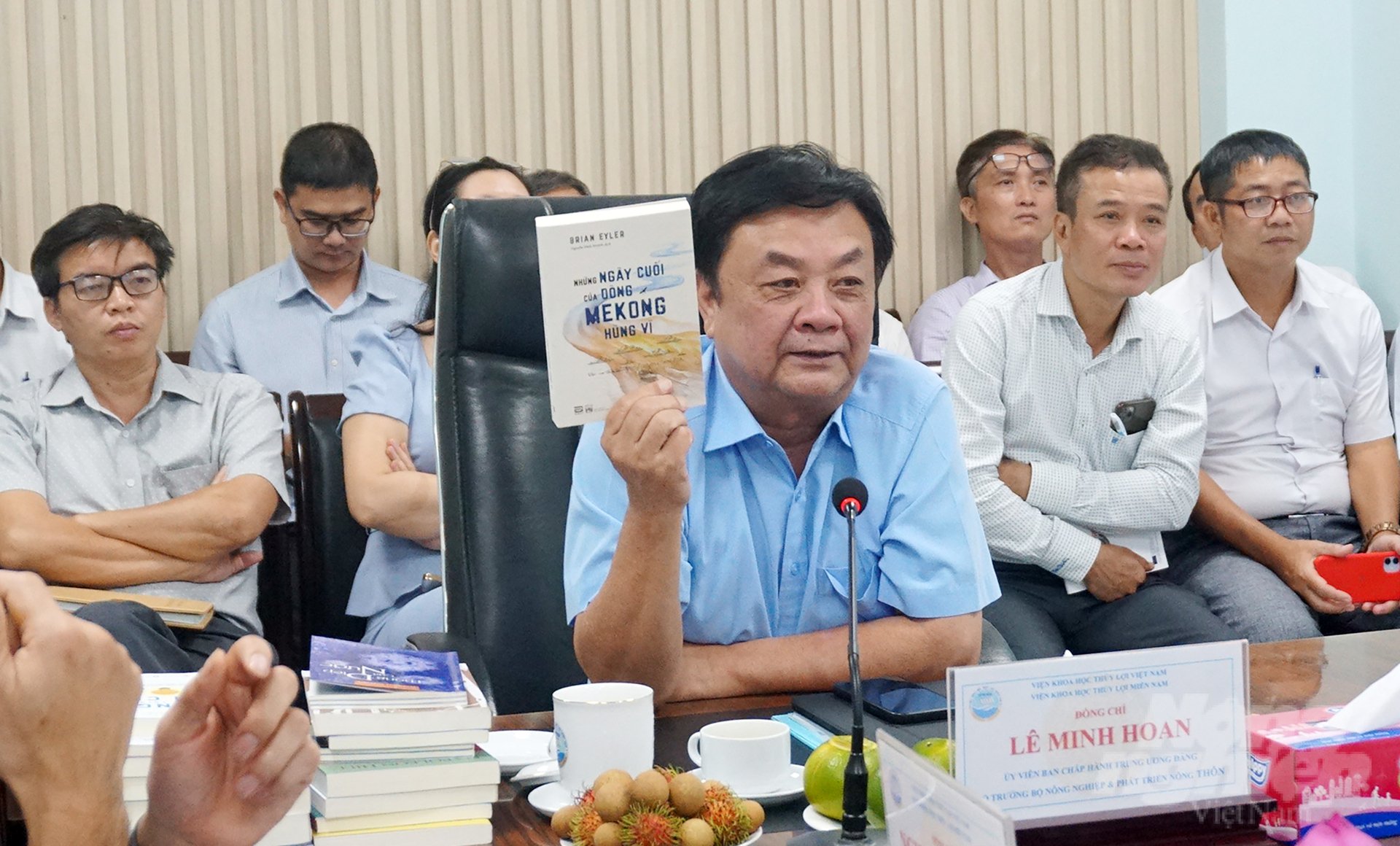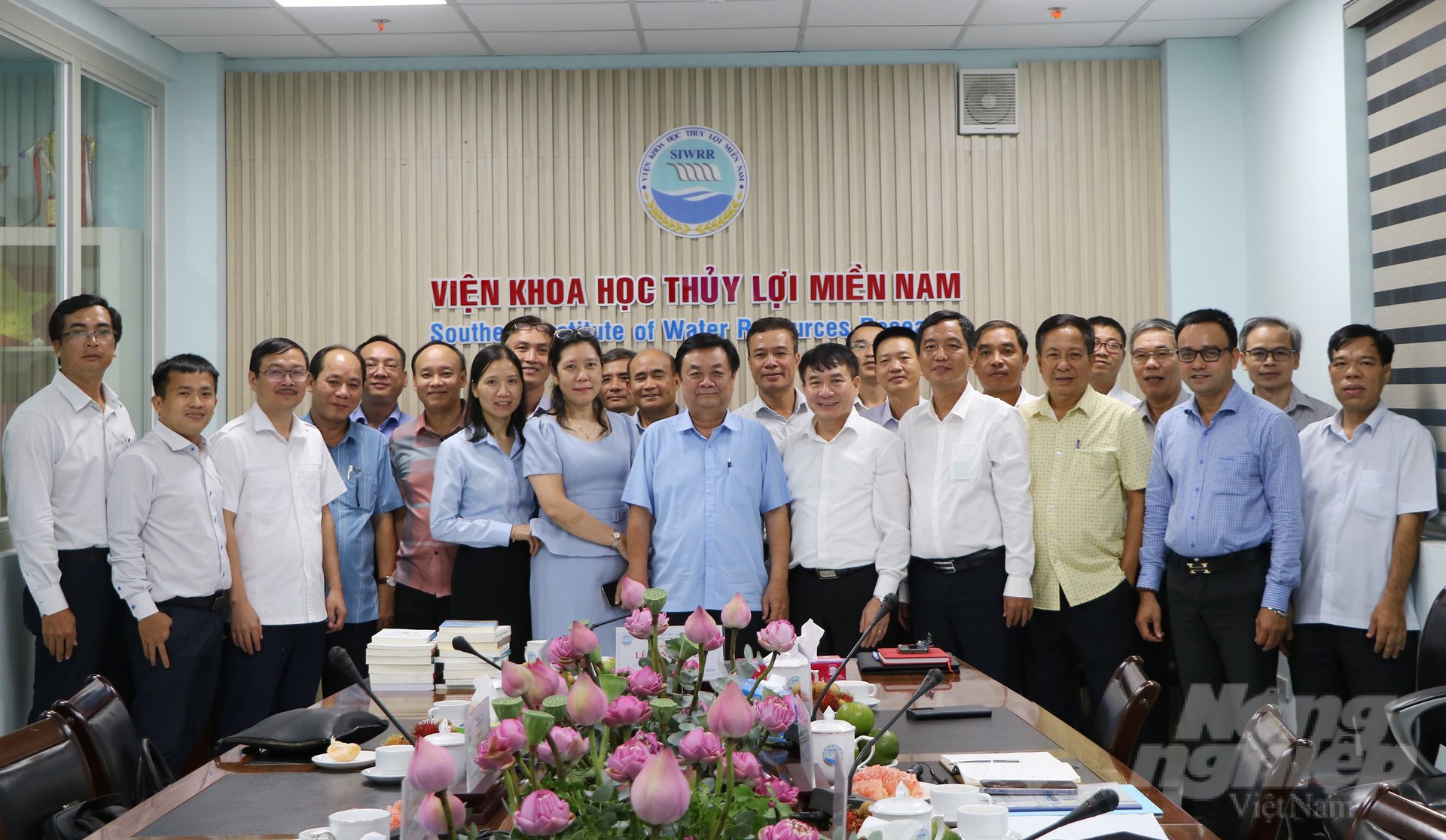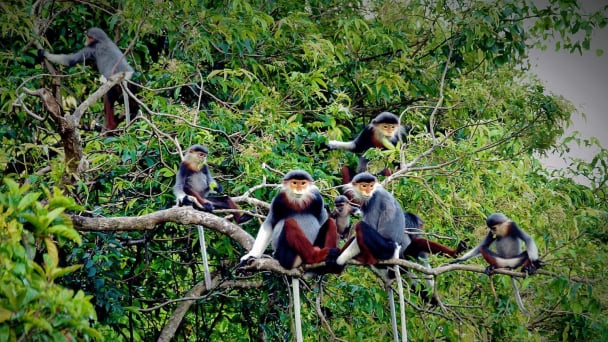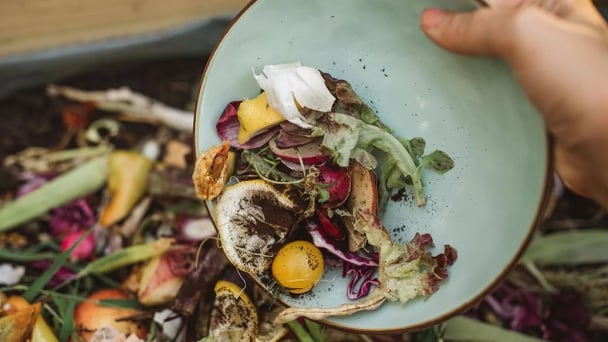May 17, 2025 | 23:01 GMT +7
May 17, 2025 | 23:01 GMT +7
Hotline: 0913.378.918
May 17, 2025 | 23:01 GMT +7
Hotline: 0913.378.918

Minister Le Minh Hoan introduced the book "Last Days of the Mighty Mekong" to officials and scientists of the Southern Institute of Irrigation Science. Photo: Nguyen Thuy.
At the meeting and working session with the Southern Institute of Irrigation Science on the evening of August 3, Minister Le Minh Hoan expressed and acknowledged the results that the Southern Institute of Irrigation Science (referred to as the Institute ) has achieved in the past time and send congratulations to the staff, staff, and scientists of the Institute on the occasion of the 45th anniversary of its establishment (August 19, 1978 - August 19, 2023).
Through the story in the book "Last Days of the Mighty Mekong", the Minister suggested that irrigation scientists approach a more open space with the specialization of irrigation. "Because the river has its voice, it has its culture. If we only focus on science, we will forget or fail to convince people," the Minister said and further suggested it is necessary to provide impacts on the ecosystem and livelihoods of millions of people in the Mekong Delta, the effects that have caused many people to leave along the two sides of the Tien and Hau rivers if the irrigation system problems are not resolved, instead of just giving numbers, graphs.
According to Minister Le Minh Hoan, the irrigation system is a tool and a means to achieve higher agricultural production values and better farmers' lives. The irrigation system not only brings water to the people but also to the living space of the people.

Minister Le Minh Hoan and the delegation took souvenir photos with officials and scientists of the Southern Institute of Irrigation Science. Photo: Nguyen Thuy.
The Minister suggested that scientists need to have a more prosperous, broader, and more comprehensive view and then see scientific ideas that solve many problems, especially the problem of flow and landslides. Scientific research begins with an idea. It solves a pressing issue in social life. From there, the Institute needs to come up with ideas to develop an irrigation system associated with multi-purposes and multi-values so that it can "market and communicate" with the Ministry and localities about ideas.
“Reservoir is no longer a reservoir but a multi-functional, multi-purpose, multi-value project, doing community tourism. Economic thinking must also be put into scientific research to generate income, create livelihoods, and create jobs for people from their work.
We prove to the locality that the Institute's work is not only to solve this problem but also to create livelihoods and an economy for the local so that Party and State leaders can see the result of scientific research on irrigation is multi-purpose and multi-valued", the Minister suggested and suggested to the Institute why the Mekong Delta provinces such as Can Tho and An Giang proposed to build water reservoirs.

Assoc. Prof. Dr. Tran Ba Hoang, Director of the Southern Institute of Irrigation Science, reported to the Minister and the delegation. Photo: Nguyen Thuy.
Assoc. Prof. Dr. Tran Ba Hoang, Director of the Southern Institute of Irrigation Science, said that the Institute developed three main axes: scientific research, training, and technology transfer. In the past five years, the Institute has made timely forecasts for localities to minimize damage, such as forecasting and monitoring saline intrusion in the Mekong Delta; term forecast of the Southeast provinces; water source forecast; Prediction of riverbank and coastal erosion.
The Institute has recently participated in anti-flood plans for Ho Chi Minh City, Can Tho, and Ca Mau. However, currently, resources are limited, so the implementation of the works is slow. Besides, the Institute also applies new technologies in design and management. In addition, the Institute has a 3-ha Southern General Laboratory located in Binh Duong, experimenting with management models of irrigation works, huge ones such as Cai Lon - Cai Be.
Regarding postgraduate training, since 1998, the Institute has conducted 36 training courses for scientists in the Institute and other universities (University of Architecture, Thu Dau Mot University, University of Natural Resources and Environment, HCMC). In addition to training, the Institute also sends staff to train in the Netherlands, Japan, England, and Germany.
In recent years, the Institute has focused on scientific and technological results and has been applied in practice, accounting for over 70% of national and ministerial-level tasks. And especially from 2020 to now, the Institute has published 34 scientific articles in prestigious journals...
The Director of the Southern Institute of Irrigation Science made four recommendations: To continue to be assigned the task of researching strategic scientific topics of the industry and the country according to functions, duties, and locations;
Allowing to improve and strengthen equipment at the laboratory in Binh Duong to serve scientific research and transfer;
To further facilitate international cooperation to improve capacity, significantly develop into a large international cooperation training center in the region, to have opportunities for development and learning;
To facilitate for sharing of data of the Ministry of Natural Resources and Environment to serve the research and forecasting of the irrigation sector.
Translated by Ha Phuc

(VAN) The United Nations designated 22 May as the International Day for Biodiversity 2025 with the theme 'Harmony with nature and sustainable development.'
![Multi-channel, multi-directional Vietnamese agricultural markets: [8] A national strategy is needed](https://t.ex-cdn.com/nongnghiepmoitruong.vn/608w/files/phucpm/2025/05/15/1435-thi-truong-nong-san-viet-da-kenh-da-huongbai-8-can-mot-chien-luoc-quoc-gia-084750_728.jpg)
(VAN) The Chairman of Hung Nhon Group shared: ‘Opening up and tapping into new markets is the right and strategic direction for Vietnam's agricultural sector.’

(VAN) Food waste has become a serious issue in modern society, especially in rapidly urbanizing and developing cities like Hanoi.
![Multi-channel, multi-directional Vietnamese agricultural markets: [7] Deep processing makes global reach easy](https://t.ex-cdn.com/nongnghiepmoitruong.vn/608w/files/huytd/2025/05/16/2946-che-bien-sau-chia-khoa-vang-nang-tam-nong-san-viet-tren-ban-do-the-gioi-080603_110-093858.jpg)
(VAN) The application of deep processing technology is helping Vietnamese agricultural products enhance their value, create competitive advantages, and open doors to conquer global consumers.
![Multi-channel, multi-directional Vietnamese agricultural markets: [6] Agri products go online](https://t.ex-cdn.com/nongnghiepmoitruong.vn/608w/files/content/2024/12/10/1-113313_954.jpg)
(VAN) Bringing agri products onto e-commerce platforms is an effective way to build a brand that many businesses, cooperatives, and agricultural production households are doing.

(VAN) Veterinary training should focus on quality, not just quantity. Veterinarians also need more options to pursue specialized training.

(VAN) The veterinary industry needs to be viewed objectively and further invested in to properly demonstrate its role and importance in the new context.